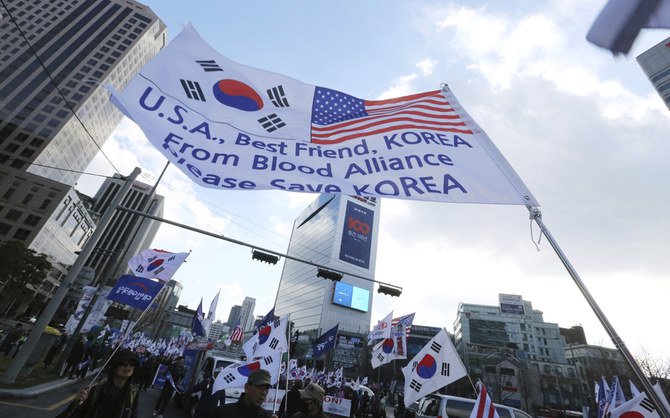Increased security at US bases in South Korea after threat

The US military increased security at its bases across South Korea after some of its service personnel were threatened.
About 28,000 US troops are stationed in South Korea, which remains at war with North Korea as their 1950s conflict ended in a truce and not a permanent peace treaty.
But there is growing disquiet about this military presence, especially since President Donald Trump’s administration changed the defense cost-sharing deal and even demanded more money.
“We were told by some of the US soldiers (they) were recently threatened by a South Korean man with a weapon or a dangerous object,” a US Force Korea (USFK) official told Arab News, asking not to be identified. “Upon receiving the information, the USFK commander issued a force protection warning to US military installations.”
The official did not say if the soldiers were hurt or if specific measures were in place, such as a lock-down. The incident took place near USFK headquarters in Pyeongtaek, which is about 70 kilometers south of Seoul.
Earlier in the week USFK posted a “force protection” warning on social media.
“Law enforcement officials notified USFK of a potential threat by an individual against U.S. military installations in the Republic of Korea. Organizations from USFK, the Republic of Korea, and law enforcement are cooperating to appropriately assess the credibility of the threat. During this time, you may see increased force protection measures.
“USFK requests your patience and cooperation as we work collectively to ensure our service members, families and community remains safe and secure.”
Anti-USFK rallies are common in South Korea and opposition soared in 2002, when two 14-year-old girls were struck and killed by a US armored vehicle.
Recent months have seen demonstrations against Washington’s demands. In February, Seoul agreed to pay $920 million for defense cost-sharing, an 8 percent increase from the $830 million paid last year.
It also agreed to renew the cost-sharing contract every year instead of every five years in the face of US pressure. An annual renewal of the contract could represent a financial burden for Seoul as the Trump administration has demanded Seoul pay “much more.”
